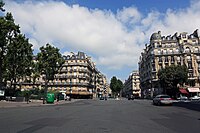Sèvres-Babylone (Paris Metro)
History
Line 12's station opened on 5 November 1910 as part of the original section of the Nord-Sud Company's line A between Porte de Versailles and Notre-Dame-de-Lorette. It was then named Sèvres–Croix-Rouge, after the nearby rue de Sèvres, a road in which in medieval times ran from Paris to Sèvres, as well as the nearby carrefour de la Croix-Rouge (today known as place Michel-Debré).
On 30 December 1923, line 10's station opened by the Compagnie du chemin de fer métropolitain de Paris (CMP) as part of the first section of the Ligne circulaire intérieure (inner circular line) from Invalides (now on line 13) to Croix-Rouge (a ghost station east of Sèvres–Babylone, closed since World War II).
Initially, line 10's station was supposed to be named Babylone (after the nearby rue de Babylone, named in 1673 after the Catholic Bishop of Babylon) while line A's station was still named Sèvres–Croix-Rouge. However, shortly before the opening of line 10, the city forced the two companies to consolidate it into a single station with it adopting a common name, Sèvres–Babylone, as it is still known as today. These circumstances resulted in the peculiar signages at the station; the signages of line 10 read Sèvres-Babylone (emphasising Babylone) whereas that of line A read Sèvres-Babylone (emphasising Sèvres).
On 27 March 1931, line A became line 12 when It was taken over by the Compagnie du chemin de fer métropolitain de Paris (CMP), incorporating it into the Paris Métro.
As part of the "Un métro + beau" programme by the RATP, the station's corridors were renovated and modernised on 21 October 2005.

Until 2008, line 10's platforms featured an exhibition on ecology, with showcases on waste recycling, renewable energy, and the consumption of water and electricity around the world. It was then replaced with panels that related specifically to the commitments of the Grenelle de l'environnement, with key points of public policy on environmentalism and sustainable development. It was however, removed at the end of 2015, with the green and yellow tiles above the display cases replaced with white tiles, putting an end to the original decoration of the platforms.
In 2019, the station was used by 5,037,509 passengers, making it the 80th busiest of the Métro network out of 302 stations.
In 2020, the station was used by 2,441,636 passengers amidst the COVID-19 pandemic, making it the 90th busiest of the Métro network out of 304 stations.
In 2021, the station was used by 3,392,504 passengers, making it the 88th busiest of the Métro network out of 304 stations.
Passenger services
Access
The station has three accesses:
- Access 1: rue de Sèvres
- Access 2: rue Velpeau Le Bon Marché
- Access 3: Boulevard Raspail (with an ascending escalator)
Station layout
| Street Level | ||
| B1 | Mezzanine | |
| Line 12 platforms | Side platform, doors will open on the right | |
| Southbound | ← | |
| Northbound | | |
| Side platform, doors will open on the right | ||
| Line 10 platforms | Side platform, doors will open on the right | |
| Westbound | ← | |
| Eastbound | | |
| Side platform, doors will open on the right | ||
Platforms
Both lines have a standard configuration with 2 tracks surrounded by 2 side platforms although the lower portion of the side walls on line 12's platforms are vertical instead of elliptical, as with the other stations constructed by the Nord-Sud company (today on lines 12 and 13).
Other connections
The station is also served by lines 63, 68, 70, 83, 84, 86, and 94 of the RATP bus network.
Nearby
- Hôtel Lutetia
- Le Bon Marché
- Prépa ISP
- Sciences Po
Gallery
-
Boulevard Raspail crossing rue de Sèvres and rue de Babylone. The station is on the left.
-
MF 67 on line 12
-
Access 1
-
Access 2
-
Access 3
References
- ^ "rue de Sèvres". Paris Digest. 2018. Retrieved 26 September 2018.
- ^ "Un jour, une station : Sèvres-Babylone, l'apogée du style Nord-Sud". RATP (in French). 12 August 2022. Retrieved 23 April 2023.
- ^ "SYMBIOZ - Le Renouveau du Métro". www.symbioz.net (in French). Retrieved 23 April 2023.
- ^ "Trafic annuel entrant par station du réseau ferré 2019". dataratp2.opendatasoft.com (in French). Archived from the original on 21 January 2022. Retrieved 24 April 2023.
- ^ "Trafic annuel entrant par station du réseau ferré 2020". data.ratp.fr (in French). Archived from the original on 21 January 2022. Retrieved 24 April 2023.
- ^ "Trafic annuel entrant par station du réseau ferré 2021". data.ratp.fr (in French). Retrieved 24 April 2023.
- Roland, Gérard (2003). Stations de métro. D’Abbesses à Wagram. Éditions Bonneton.




